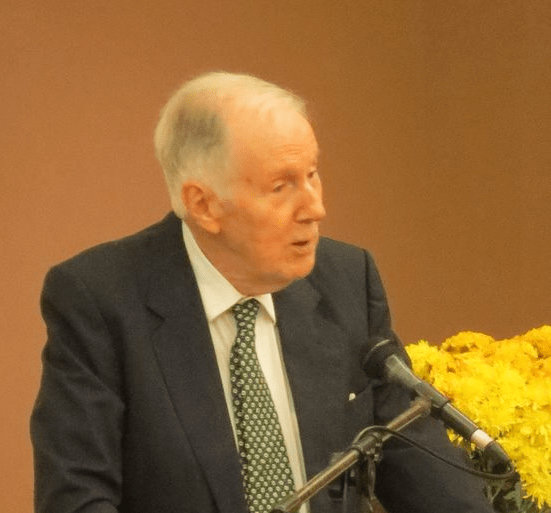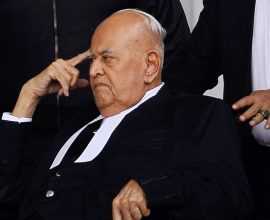The Peter Mooney I knew
One day in 2006, while autumnal winds were nipping at my heels, Peter Mooney opened a door. He led me into Aladdin’s Cave, filled with the universal beauty of language, a love of nature, an enduring journey with history; and submission to a Higher Power.
A complex persona of a myriad interests
As a person, Peter Mooney was infinitely more complex than the person he portrayed: reticent, diffident, and self-effacing – which is true — yet his work, his output, and his interests were varied, and myriad.
To compress them all into a single essay would be impossible, even a travesty if all he stood for:
The details as to his origins, his passage from Ireland to Sarawak in 1953 as Crown Counsel; his ascension as Attorney General of Sarawak, his move to peninsular Malaysia, his establishment of the legal firm Skrine; his training of the most successful advocates at the Bar; his services to the Malaysian Bar; the sanctuaries he provided to the homeless, the distraught and the oppressed; the children he adopted and made his family; sons whom he insisted keep their Islamic faith; his assistance to numerous charitable organisations, ‘the Befrienders’ being only the one; the royal titles, honours, and recognition showered upon him; his lifelong interest in classical music; his love of fine wines, poetry, gardening and whodunnit novels – and through all that – his steadfast loyalty to the Catholic church: these are all spoken for.
There is far too much material to write on all of this.
Tun Hussein Onn Committee
Back in 1980, Peter sat as a member of the Tun Hussein Onn Committee. It proposed that society must have a direct say on how errant lawyers ought to be disciplined.
The 1980 proposals were nothing short of revolutionary.
Society could determine – and not a bunch of the errant lawyer’s self-serving friends – whether the errant lawyer should receive a slap on his wrist, or if he should be run off the Bar for good. It is a principle not followed in any other profession.
The former PM, Tun Hussein Onn, was the first signatory to that report.
Peter was the fifth.
You would be interested to know that the ninth signatory is the current Attorney General, Tan Sri Tommy Thomas.
When I first met him, I knew nothing of these things.
As I discovered these only recently, I must contend myself in describing a serendipitous event.
I knew Peter for seven days. It arose in this way.
The 2006 Committee meetings
In 2006, the Bar Council set up a committee to study how errant lawyers should be disciplined; and if the process could be improved.
Peter was a member of that committee, along with Tan Sri VC George, Datuk Vazeer Alam Mydeen Meera JCA, Dato Kuthubul Zaman, Ms. Lalitha Menon, and I.
We met seven times. Each meeting lasted many hours. Peter was there all the time.
I found out why — but only later:
Peter had had a 40-year association with laws relating to the discipline of legal practitioners.
He had also laid the cornerstone to the Legal Profession Act 1976.
And so, even to this day, every section of Legal Profession Act 1976 scintillates with Peter’s spirit.
A sudden shaft of light
During Committee breaks, we got talking. He spoke of his love for history and the English language.
I asked what he thought were the most beautiful books written on both subjects.
When I mentioned Thomas Carlyle’s 1837 classic, ‘The French Revolution’, Peter was dismissive, saying, ‘blasé’.
He asked,
‘Have you read H. A. L. Fisher’s, ‘A History of Europe? It was published in 1936’.1London : E. Arnold, 1936
When I expressed ignorance – [I mean, what do you expect of a guy who only went to a Tamil school and had no idea of English literature?] – he suggested,
‘Go find it. Fisher writes it in the most felicitous language.’
Having grown up on Edward Gibbon’s ‘Decline and Fall of the Roman Empire’, Peter’s analysis piqued my curiosity.
And Peter’s timing was propitious
Some weeks later, I had to visit New College, Oxford.
There, I asked the university librarians about it. Discovering, to my dismay, that the book had been out of print for some decades, I was eventually shown to a modern bookshop. Further inquiries led me to a cadaverous man on the top floor.
Having heard me silently, he reached for the telephone. He spoke a few words. I heard the words, ‘Yes, the Fisher book.’
Then he turned towards me:
‘Are you up for a jaunt?’
Trembling with anticipation, I nodded.
‘There is an antiquarian bookshop about 5 miles down this road’, he said, raising a gnarled finger to a road beyond a window.
‘I doubt you will find Fisher anywhere here, but if you can find it at all, that would be the place.’
A long walk
By the time I stepped out of the shop, the afternoon had given way.
The weather was balmy. A five-mile hike in the country did not seem such a bad idea.
I set off.
Along the way, as I saw the landscape, I fell into some lines of Thomas Gray – from a poem that even he had thought unimportant:
‘The curfew tolls the knell of parting day,
The lowing herd wind slowly o’er the lea
The ploughman homeward plods his weary way…’.2Elegy Written in a Country Churchyard, 1750, Thomas Gray
The old shop
Eventually, an old shop appeared at the end of a curve. A weather-beaten door beckoned. Opening it, I heard a soft bell ring–once–at the rear. The threshold led to a foyer.
A massive man behind a bush of a beard emerged from the gloom. He filled the shop with his silence.
When told of the title of the book, he raised a palm, and disappeared into the rear.
Tapping my feet, I inspected the shop.
It was filled with a kaleidoscope of colours.
From floor to ceiling, towers of books rose, twisting off into misty heights. Narrow spaces between these towers led off into shadowed pathways, filled with piles and piles of old books.
Eventually, the shopkeeper returned. He clutched a leather-bound volume.
‘It is more than 60 years old,’ he said, turning the volume over, the way a jeweller inspects a diamond.
‘The book has a history. A school presented as a book prize it to a 13-year old boy. He stood first in history.’
Peering over his horn-rimmed spectacles, he named the price.
It was steep. I did not argue.
As I was about to alight into the street, the shopkeeper beckoned me over, and asked,
‘Do you know how to look after an old book?’
I spoke to him of my own collection of books. He seemed mollified.
Trudging back in the company of Fisher, Virgil, Dante, Gray … and Peter
As I trudged back, the light began to fade. The second half of Gray’s stanza floated back:
‘And leaves the world to darkness and to me.
Now fades the glimm’ring landscape on the sight,
And all the air a solemn stillness holds,
Save where the beetle wheels his droning flight,
And drowsy tinklings lull the distant folds;
Save that from yonder ivy-mantled tow’r
The moping owl does to the moon complain
Of such, as wand’ring near her secret bow’r,
Molest her ancient solitary reign.’ 3lines 1–12
Save the occasional car, there was little traffic.
Wondering why Peter had thought so highly of this unobtrusive volume, I slowed to a saunter and turned over a few passages.
One caught the eye.
In it, Fisher compares the poet Dante to different writers of his period. Dante, he describes as, ‘the third great figure in the Catholic firmament’. Of him Fisher says,
‘Dante is not, then, the first, but it is most remarkable in that long list of apocalyptic writers (among whom bunion must be mentioned) who, through the allegory of an imaginary voyage or vision, have attempted to depict the destiny of the soul.’4Ibid, p. 285
Strong words: and not at all about history, but poetry, which Fisher confirms with these words:
‘…Dante draws no clear line between ancient mythology and true history.’
Was it this ambiguity that had fascinated Peter?
‘The 25th Chapter: The Catholic Mind’
Then there appears a passage at the 25th chapter. It was appropriately worded, ‘The Catholic Mind’.
Peter, as you might have guessed, was a Catholic.
I stopped walking. The passage was riveting.
It was Fisher’s analysis of how Virgil influenced Dante. He says:
‘Among medieval poets, Dante stands closest to Virgil for the delicacy and minuteness of his observation.
The storm crashing through the forest; the frogs slipping into the water from the snake, the lizard which crosses the road like a flash of lightning, the fireflies seen by the peasant in the gloaming, the old cobbler narrowly eyeing his needle, the boxers, their bare bodies gleaming with oil as they stand watching one another for their point of vantage, the duck dipping to escape the falcon, the mother who clutches as a child on the alarm of fire, the gamesters crowding round the winner — here are pictures painted fresh from the life. And it is to the frogs, cranes, lizards, ducks, and falcons, to the sheen of fish gliding to their food in a tank of pure and still water, to the peasant who rises grumbling in a hoar frost, and then a few hours later when the world has changed its face, takes his crook and leads his flocks afield, 5What a Biblical allegory! it is to such pictures of the unobtrusive aspects of Italian country life only to be paralleled in Virgil that the poetical posterity of Dante owes its principal debt. He showed that no piece of real nature, if strictly observed, is alien to the making of poetry.’6Ibid, p. 287
Who could deny the felicity of Fisher’s cadence, the ‘technique of his metre, the depth of his thought, and the range and glow of his immense imagination’,7Fisher, p. 285, second paragraph and his understanding of both Virgil and Dante?
Peter had savoured it all those years ago – and had handed them to me: a veritable treasure priceless beyond measure.
Amidst the swirling wind scattering yellowed leaves, Fisher’s words rang, as if Peter was standing right there, reciting them to me.
It had his rhythm, his inflection, his clarity.
He was an author,8‘A Servant of Sarawak’ is but one and understood the play of words: as Fisher says, ‘the greatness of a country depends upon its authors’.9 Ibid, p.284, last paragraph
And another thing: Peter was a naturalist
Despite his advancing age, Peter snorkeled, and scuba-dived.
He loved mountain climbing. And Chen Kah Leng10A senior lawyer and a consultant at the legal firm of Skrine tells me, gardening.
How appropriate that of all the books Peter had read, Fisher had commended himself to Peter.
‘Not unto us, O Lord, not unto us, but to thy name [we] give the glory’
Fisher’s words capture Peter’s scholarship, his love of history, his familiarity with Virgil and Dante, his fascination with nature – and his humility before all of God’s creation.
It was then I could glimpse into the provenance of Peter’s self-effacing demeanour. It comes – say close friends – from a foundational passage in Psalm 115:11The Psalm numbering can be confusing. Hieronymus in his numbering of the Psalms for the Vulgate (Latin Bible) used the Septuagint (Greek translation of the Bible) system of numbering. Every Psalm in Latin follows this numbering. Protestants generally returned to the numbering of the Hebrew Bible. Almost all modern bible-editions use the Hebrew numbering.
‘Non Nobis Domine’.12Non nobis is the introductory title of a short Latin-Christian hymn used as an expression of humility. The Latin text is from the Vulgate translation of the Book of Psalms, Psalm 113:9 in Vulgate numbering (Psalm 115:1 in Greek/Hebrew numbering): Nōn nōbīs, Domine, nōn nōbīs, sed nōminī tuō dā glōriam (KJV: ‘Not unto us, O Lord, not unto us, but to thy name [we] give the glory.’ ).
This Latin phrase has been translated as meaning, ‘Not unto us, O Lord’,13King James Bible and it is part of the longer translation,
‘Not unto us, O Lord, not unto us, but to thy name [we] give the glory.’ 14‘Nōn nōbīs, Domine, nōn nōbīs, sed nōminī tuō dā glōriam’.
In 1934, Rudyard Kipling incorporated it as his opening stanza in a poem – with the same name.15Dig a little deeper, and you will find that Roger Quilter set the poem to music.
On occasion, Peter would point to it as the one principle that became the fulcrum of his life. When the Catholic Lawyers Society, which Peter had co-founded, celebrated his 90th Birthday in May 2013, Peter quoted Kipling – verbatim.
These words speak to me of his humility, his surrender to a Higher Power, the sincerity of his motive, and the eyes with which he saw the world.
Grays’ epitaph: ‘Large was his bounty, and his soul sincere…’
When I heard he had passed, my thoughts turned to the epitaph at the end of Gray’s poem:
‘Here rests his head upon the lap of Earth
A youth to Fortune and to Fame unknown.
Fair Science frown’d not on his humble birth,
And Melancholy mark’d him for her own.
Large was his bounty, and his soul sincere,
Heav’n did a recompense as largely send:…’
And thus shall I remember him:
The 10-mile hike in 2006,
Fisher in my hands,
Virgil and Dante ringing in my ear,
the autumnal winds,
and that gentle smile of Peter Mooney.





